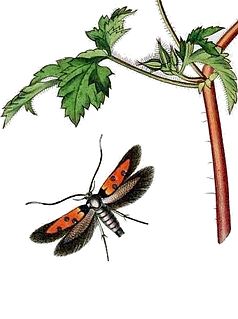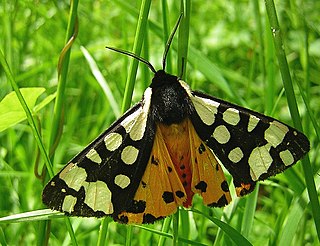
The geometer moths are moths belonging to the family Geometridae of the insect order Lepidoptera, the moths and butterflies. Their scientific name derives from the Ancient Greek geo γῆ or γαῖα "the earth", and metron μέτρον "measure" in reference to the way their larvae, or "inchworms", appear to "measure the earth" as they move along in a looping fashion. A very large family, it has around 23,000 species of moths described, and over 1400 species from six subfamilies indigenous to North America alone. A well-known member is the peppered moth, Biston betularia, which has been subject of numerous studies in population genetics. Several other geometer moths are notorious pests.

The Arctiinae are a large and diverse subfamily of moths, with around 11,000 species found all over the world, including 6,000 neotropical species. This group includes the groups commonly known as tiger moths, which usually have bright colours, footmen, which are usually much drabber, lichen moths, and wasp moths. Many species have "hairy" caterpillars that are popularly known as woolly bears or woolly worms. The scientific name of this subfamily refers to this hairiness. Some species within the Arctiinae have the word tussock in their common name due to people misidentifying them as members of the Lymantriinae based on the characteristics of the larvae.

The Agonoxeninae are a subfamily of moths.

The Hepialidae are a family of insects in the lepidopteran order. Moths of this family are often referred to as swift moths or ghost moths.

Oenosandridae is a family of Australian noctuoid moths. Genera include:

Gelechioidea is the superfamily of moths that contains the case-bearers, twirler moths, and relatives, also simply called curved-horn moths or gelechioid moths. It is a large and poorly understood '"micromoth" superfamily, constituting one of the basal lineages of the Ditrysia.

The Arctiini are a tribe of tiger moths in the family Erebidae.

The Adelidae or fairy longhorn moths are a family of monotrysian moths in the lepidopteran infraorder Heteroneura. The family was first described by Charles Théophile Bruand d'Uzelle in 1851. Most species have at least partially metallic patterns coloration and are diurnal, sometimes swarming around the tips of branches with an undulating flight. Others are crepuscular and have a drab coloration. Fairy longhorn moths have a wingspan of 4–28 millimeters, and males often have especially long antennae, 1–3 times as long as the forewing.

The Batrachedridae are a small family of tiny moths. These are small, slender moths which rest with their wings wrapped tightly around their bodies.

Pterolonchidae is a small family of very small moths in the superfamily Gelechioidea. There are species native to every continent except Australia and Antarctica.

The Archipini are a tribe of tortrix moths. Since many genera of these are not yet assigned to tribes, the genus list presented here is provisional.

The Spilosomina are a subtribe of tiger moths in the tribe Arctiini, which is part of the family Erebidae.

The Arctiina are a subtribe of moths in the family Erebidae.
Dolgoma is a genus of moths in the family Erebidae. The genus was described by Moore in 1878.
Eyralpenus is a genus of tiger moths in the family Erebidae. The genus was erected by Arthur Gardiner Butler in 1875. The moths in the genus are found in the Afrotropics.

The Cochylini are a tribe of tortrix moths. It used to be classified as the subfamily Cochylinae.

Sterrhinae is a large subfamily of geometer moths with some 3,000 described species, with more than half belonging to the taxonomically difficult, very diverse genera, Idaea and Scopula. This subfamily was described by Edward Meyrick in 1892. They are the most diverse in the tropics with the number of species decreasing with increasing latitude and elevation.

The Euliini are a tribe of tortrix moths.
William Warren was an English entomologist who specialised in Lepidoptera.

Gracillariinae are a subfamily of moths which was described by Henry Tibbats Stainton in 1854.
















